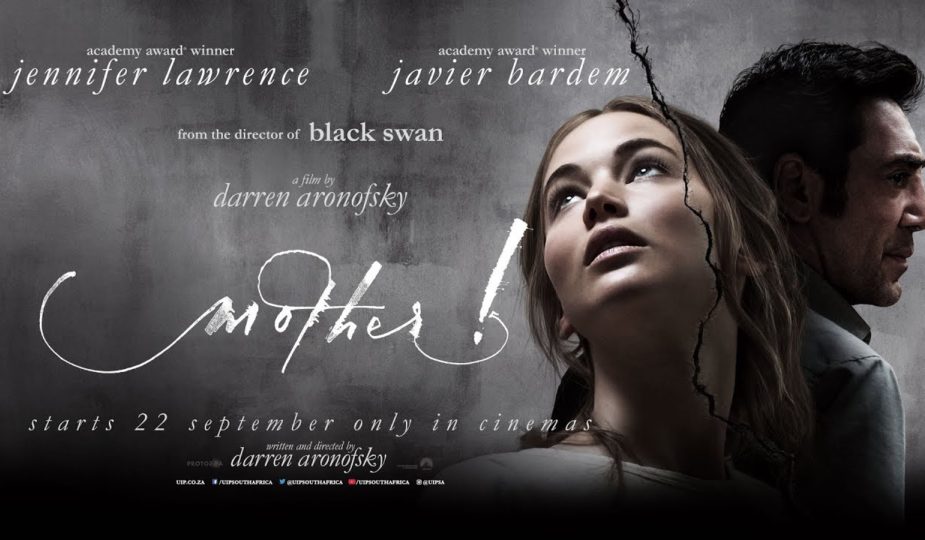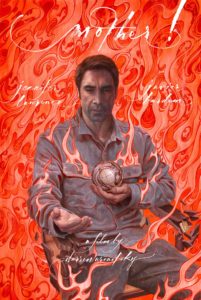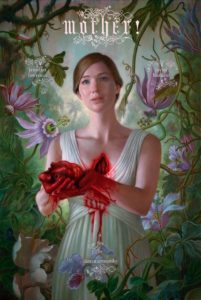
Mother! (2017)
Darren Aronofsky has an ability to delve into the universe of complex themes and create stories that are packed with metaphors and symbolism. His darkly attractive style of lucid despondency and furious intentions has made his cinema one of the most uniquely inspiring and eclectic in contemporary film.
Mother! (2017), reached a new and fresh crescendo of the director’s iconic stylization. The film is blending elements from all of his previous works such as Black Swan (2010), Requiem for a dream (2000), and Pi (1998). Treading in the footsteps of Polanski’s Rosemary’s Baby (1968), Repulsion (1965) and Buñuel’s The Exterminating Angel (1962); Aronofsky created a cacophony of bone-chilling nerves and bleeding hearts. Multiple viewings and discussions may not be enough to cover the wellspring of mystery, sentiment, and allusion that the director manages to evoke with Mother!.
It all takes place in the middle of nowhere. We contemplate the insides of an enigmatic, half-finished Victorian mansion. Inside, a famous poet known as “Him” (Javier Bardem), suffers writer’s block. He lives with his beautiful young wife, identified as “Her” (Jennifer Lawrence). She is dedicated to rebuild the old house that was destroyed by a big fire recently. The couple’s quiet life is interrupted when a mysterious character introduced as “Man” (Ed Harris), knocks on the door one night. The man is looking for a place to stay. He immediately praises the poet’s writing and quickly befriends him, much to the discontent of his wife. The next day, “Woman” (Michelle Pfeiffer) arrives. During the following days, the poet receives the rest of the man’s family, completely ignoring his wife’s objections and wishes.
young wife, identified as “Her” (Jennifer Lawrence). She is dedicated to rebuild the old house that was destroyed by a big fire recently. The couple’s quiet life is interrupted when a mysterious character introduced as “Man” (Ed Harris), knocks on the door one night. The man is looking for a place to stay. He immediately praises the poet’s writing and quickly befriends him, much to the discontent of his wife. The next day, “Woman” (Michelle Pfeiffer) arrives. During the following days, the poet receives the rest of the man’s family, completely ignoring his wife’s objections and wishes.
“Who are these people?” she asks him. She never gets a clear answer. We only know that they are huge fans of the poet’s work. This puts us in a position where we can analyze the clues and figure out who everybody is, the poet and his wife included. Or, if not quite who they are, then at least what they are trying to represent.
The wife spends most of the movie in close-ups that reveal complete anxiety. New strangers keep coming into her house, and she wants them to leave, but they won’t. They do bizarre things and ask weird questions. Every basic need and desire that the wife expresses goes unheeded as she continues to do the emotional labour for everyone who enters the house. The film moves further and further into her psychosis, until you’re not thinking about the logic of what’s going on anymore, but only the feelings.
In Mother!, Aronofsky summarizes humanity’s history in a bold, original and unexpected trail. The plot’s undertones spin around genesis and biblical references. Bardem’s character is a poet that finds no inspiration, referring to God before the creation of man and woman. Meanwhile, Lawrence’s character represents Mother Nature: she rebuilds and gives life to the house, lifting it from ashes. Hence comes the story of Eve, Adam, and Cain & Abel, whose characters demonstrate devotion and respect to the character of Bardem.
The story separates the acts of Mother Earth from those of God. There is  overcrowding in the house of Mother Earth: insane amounts of overpopulation, wars and hatred. The place starts to get dirty and destroyed because of contamination and the depraved behavior of people. At one point, Mother Nature shakes the house and kills several of the worshipers, symbolizing natural disasters and those acts beyond the control of humanity. These acts are independent of God, they are reactions of Mother Earth to protect herself. Therein lies the filmmaker’s real experiment, making humanity witness its own self-destructive, erratic, unjustified, bizarre and often incomprehensible behavior.
overcrowding in the house of Mother Earth: insane amounts of overpopulation, wars and hatred. The place starts to get dirty and destroyed because of contamination and the depraved behavior of people. At one point, Mother Nature shakes the house and kills several of the worshipers, symbolizing natural disasters and those acts beyond the control of humanity. These acts are independent of God, they are reactions of Mother Earth to protect herself. Therein lies the filmmaker’s real experiment, making humanity witness its own self-destructive, erratic, unjustified, bizarre and often incomprehensible behavior.
Aronofsky’s film is a bold, polemic and unforgettable experience. There’s a lot going on in this highly sub-textual and allegorical story. Mother! is a dark nightmare that also touches on the difficulties of marriage, birth, death, and the creative process. It is brilliant, horrifying, dreamlike, and highly ambitious. Chances are you’ll be trying, in vain, to get it off your mind and out of your own dreams for some time to come.
In Oscar Wilde‘s words: “They’ve promised that dreams can come true – but forgot to mention that nightmares are dreams, too.”
by Octavio Carbajal González

Great review for an extremely interesting film. I saw this about a year ago, and was really taken by its message and delivery. Extremely impactful. The separation of the two natures of both God and mother nature Is a unique approach that I have never anticipated. Thank you for a great review, Octavio.
Thank you for taking the time to read, Shawn.
Very pleased with your words!.
This film resonates even more in these strange times. Everyone and everything are spinning at maximum speed, there’s little room for calmness and reflection.
Mystery is composed by the origins of God and Mother Nature.
Great review Octavio. Mother is very impressive and visually skilfull movie. Once again you have find many interesing levels and viewpoints. I think this film has similar feelings as in Dario Argento’s Suspiria.
Thanks for reading, Mika !. Hope you´re doing well
I especially like the fact that this isn´t a crowd pleaser, it takes a lot of risks. Aronofsky got a lot of criticism because of the themes portrayed in the film. But, as you said, this is an impressive and visually skillful work. I´m glad you mention “Suspiria”; it definitely has an Argento vibe.
A film that will definitely leave a mark on the mind and the heart. To say I loved it would be an understatement. Just like all the major Aronofsky films, it sticks with you for a long time, if not endlessly. A solid review Octavio!
Thank you Laura !. Love your music posts, we have very similar taste.
This is Aronofsky´s most ambitious film, he knew how to blend all these complex themes without getting lost in the way. I can´t wait to see what he does next !
This thought provoking and hypnotic movie is signature Darren Aronofsky. Its certainly not a movie for everyone. I can see the influence of Buñuel’s The Exterminating Angel. Like a bad dream! Another excellent choice of movie Octavio. A difficult one to review but once again, you’ve done a superb job!
I had a very weird sensation when the credits started rolling. I remember feeling the same way when I saw David Lynch’s “Mulholland Drive.”
I definitely couldn’t leave Buñuel out of the review, surrealism had to be present.
This is one of Aronofsky’s major achievements, it grows on you as time goes by.
As always, thank you for the support, Serge!.
Aronofsky must be a sadist.
In once read a review that said : “Lovecraft meets Lynch having dinner with Gaspar Noé.”
Fair enough
Octavio,
Although I’m not an Aronofsky fan (the only one of his films that I could connect with was The Fountain), I enjoyed reading this review of Mother which has given me new insights about this film and about Aronofsky.
Thank you for reading, Mark.
The Fountain is also a very unappreciated movie inside Aronofsky´s filmography.
Mother ! evolves progressively; causing a feeling of despair, doubt and exhaustion.
I was very impressed by this movie, and I’m also impressed that you could cover such a complex film in your review- well done!
The film is very thought-provoking with all its bible allegories, and certain ideas, like God being an uninspired poet who’s repeating himself, are just intruiging (Bardem is stunning as always). Some scenes were really hard and truly subversive, but it’s like that when you’re dealing with humans and their history of violence and vileness. A surreal experience, worth watching again and again. Lots of Polanski’s “The Tenant” in there in the depiction and transformation of the house.
This is one of the most difficult reviews that I´ve covered. The film has a wide spectrum of themes, and I didn´t know where to start . As you said, we have to rewatch it again and again. Great that you mention “The Tenant” !. Need to revisit that one.
Mother Nature gives us vitality every day, without asking for anything in return. She treats us with respect and puts her resources at our disposal for responsible use. But then, the corrupt human condition appears.
The mass greedily embraces all the resources within its reach, the beast of consumerism arises…
Fortunately, after periods of confusion and violence towards ourselves and our environment, we always have the option of starting over, rebuilding the entire structure of a “new model”. But, there’s a problem: we conserve all the vices and failures of the past.
Anyway, “Mother!” contains elements that rarely work together in a film: violence, drama, horror, divinity, chaos and danger. It´s a marvelous experience.
Shocking and great movie about the history of mankind and civilization.
Beautiful description, Paul. This one has all the elements to become a cult film, it´s definitely an underrated shiny gem inside Aronofsky´s filmography.
The film is very interesting, but has one major flaw : Jennifer Lawrence. Bardem and the other actors are great, but the director’s girlfriend is simply boring.
I´m not a fan of Jennifer Lawrence, but her performance in this film blew me away. The Kubrickian camera style of “close-ups” usually puts a lot of pressure on the actors, and she knew how to handle it.
A disturbing and sick masterpiece.
Quite a unique experience, Marc. The film builds an adequate balance between horror, mystery, drama and art.